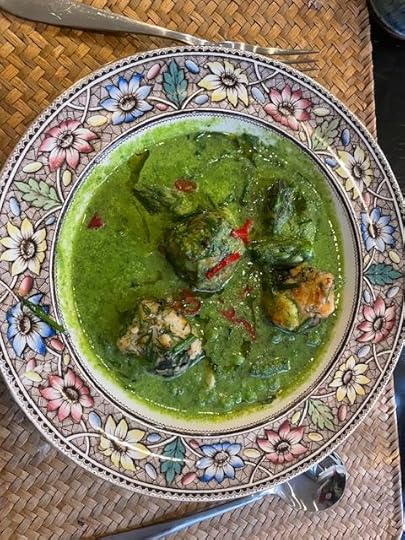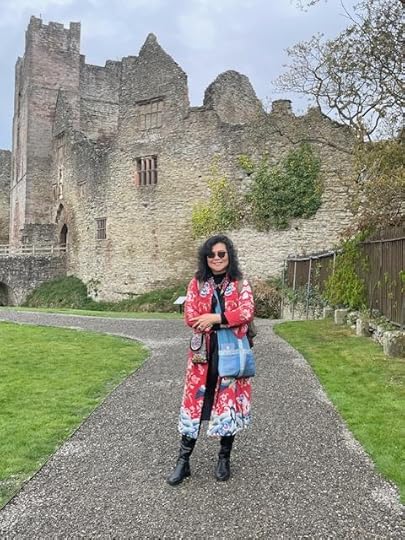Lijia Zhang's Blog, page 7
May 11, 2025
Tren de soller
Tren de Sóller
My daughter and I travelled to Sóller today aboard a tram—but not just any tram. This was the historic wooden tramway first built in 1912, a charming relic from another age. Originally designed to carry both passengers and agricultural produce, chiefly the valley’s famed oranges and lemons, it earned the affectionate nickname “the orange tram.” Before its arrival, Sóller was isolated, tacked away in a remote mountain valley. The railway transformed the town’s fortunes, opening it to trade and travel, and breathing new life into its economy.
There’s a quiet thrill in riding such a vintage carriage, listening to the old-fashioned whistle that’s all but vanished elsewhere, and the rhythmic clatter of wheels over the track. The route winds through breathtaking scenery, rolling groves, stone terraces, and the distant shimmer of mountains.
These days, nearly every visitor to Sóller arrives this way. The tram is no longer just a means of transport—it’s become part of the destination itself.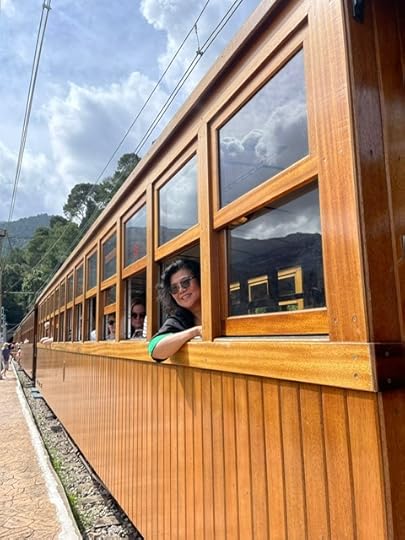
May 10, 2025
La almudaina
What a sight to behold: the Royal Palace of La Almudaina rises majestically above the Bay of Palma. Originally built as an alcázar, a fortified palace during the Muslim rule of the island in the 10th century, it was later transformed in the Gothic style by Christian kings following their conquest of Mallorca in the 13th century. Today, it remains an official residence of the Spanish royal family while in Mallorca, though its role is largely ceremonial.
What sets the palace apart is its seamless fusion of Gothic grandeur and Moorish grace—elegant horseshoe arches, lofty vaulted ceilings, and expansive halls that seem to echo with centuries of history.
Kirsty, my younger daughter, and I lingered in the royal apartments, furnished in a medieval style and adorned with tapestries, furniture, and artworks.
I found myself especially drawn to the Chapel of Santa Ana, a small gem of Gothic devotion with stunning stained glasses.
Yet nothing compares to the view—the kind that earns the phrase “million-dollar” honestly. From the palace terraces, the sea stretches out like a silken sheet, shimmering beneath the Mallorcan sun.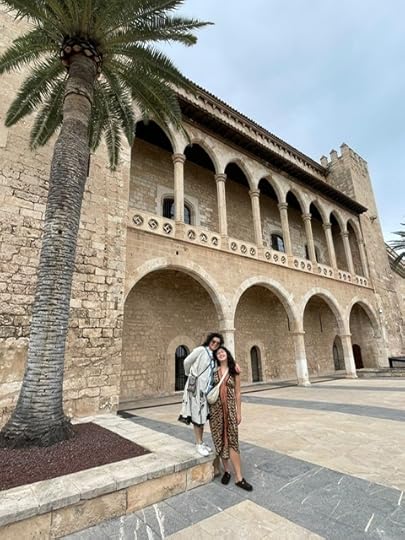
April 29, 2025
Interview with Global Voice
Here’s another interview with me, focusing on language, writing and literature written outside of China.
April 27, 2025
Food!
I’ve been trying but failing spectacularly to lose a bit of weight. One of the many culprits is an endless parade of dinners and feasts. Today, my very kind Chinese friend Iris—whose father, like me, hails from Nanjing—outdid herself by cooking more than a dozen dishes: salty duck (a Nanjing specialty), steamed sea bream, winter melon soup, chives with smoked tofu, and stir-fried sticky rice cake, just to name a few.
And that was just the warm-up. Dessert brought not one, not two, but three sweet temptations: eight treasure congee packed with preserved kumquats and dried osmanthus flowers, and various nuts and dates ( Iris painstakingly sourced some of them like a culinary archaeologist), fermented glutinous rice, and the wonderfully named “good wife cakes” (老婆饼).
Naturally, I don’t blame my friends for the state of my waistline. I blame my own boundless greed and laughable willpower.
Still, when you have friends who cook like Michelin-starred grandmas, you don’t say no. You grab a plate and count yourself lucky. Thank you, Iris!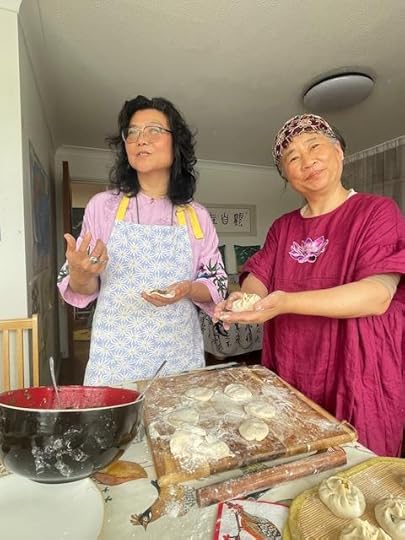
April 26, 2025
Hampton Court
Steeped in centuries of intrigue, Hampton Court Palace stands as one of England’s most magnificent historical treasures. A Grade I listed royal palace in southwest London, it is a place where the ghosts of Henry VIII, his many wives, and the grandeur of the Tudor and Baroque courts still seem to linger in the air. Visitors can lose themselves in its sprawling halls, marvel at the richly decorated Chapel Royal, stroll through the stunning Baroque Garden with its fountains and manicured lawns, and gaze up at the gilded ceilings of the King’s Apartments. Every stone here whispers of ambition, betrayal, and splendor.
I had been before, but when my old friend Tina—the former ambassador to Cambodia, where she is still based—invited me to return, I gladly accepted.
We were blessed with a beautiful day, the sun smiling overhead and bathing the world in its golden light.
Hampton Court is not only a monument to history; it is also a living celebration of beauty. Each spring, the palace grounds burst into a riot of colour during the Tulip Festival, when over 100,000 tulips—historic varieties and dazzling new hybrids—unfurl across the formal gardens, courtyards and flower beds. The display transforms the grounds into a sea of vibrant petals, perfectly complementing the palace’s majesty.
In fact, the tulips were the main reason Tina wanted to visit. Together, we attended a talk about the flower’s history—a reminder that, despite its deep association with Holland, the tulip did not originate there.
While Tina loved the Kitchen Garden, boasting rows of vegetables and herbs, my favourite corner was the kitchens themselves. Ever the foodie, I relished wandering through the labyrinthine spaces that once fed hundreds. A wood-fed fire crackled in the hearth, filling the cavernous rooms with warmth and atmosphere.
Whether drawn by the stories of kings and queens or the ephemeral glory of the tulips, a visit to Hampton Court is a step into another world, one where the past feels luminously alive.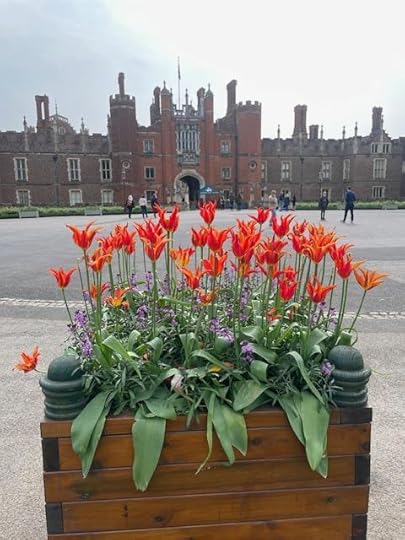
April 24, 2025
China green policy paradox
There’s a paradox in China’s environmental policy: green bonds abroad, dirty coal plants at home. Here’s my attempt to unpack the issue and explain why. Feel free to reach out if you have trouble accessing it.
https://www.scmp.com/opinion/china-opinion/article/3307482/china-must-resist-greenwashing-its-dirty-coal-habit-green-bonds
April 20, 2025
Lunch with my daughters
I had the pleasure of a splendid lunch with my daughters at the Glass Garden, a hidden gem of a Chinese restaurant tucked behind Tate Modern, where clay pot dishes arrive at the table like little cauldrons of joy. A Chinese friend introduced me to the place a few weeks ago, and ever since, it’s become my unofficial mission to take my girls there whenever I stumble upon something delicious, delightful, or vaguely life-enhancing.
Of course, coordinating three busy social calendars is not unlike trying to align the planets. But today, miraculously, the stars behaved, and we managed it. As always, the food was excellent, and the company better—we laughed over everything and nothing, the way only we can.
April 16, 2025
Ludlow
April 14, 2025
Diddlebury
April 10, 2025
Feast
I had yet another feast last night—yes, my stomach is filing for overtime. This time, I was dined at the home of Sara and John, my once-neighbours-now-forever-friends. Sara is a brilliant artist with the soul of a poet and John, the composer behind Downton Abbey (yes, that John), who also moonlights as a culinary wizard.
The pièce de résistance? Asparagus soup with lobster and prawn balls, delicately garnished with wild garlic shoots freshly plucked from their garden—as if the garden itself had joined the dinner party. Divine doesn’t begin to cover it. Honestly, I’m blessed with friends who can rival a Michelin tasting menu. Today, I really should fast. In-sha-la! (Or at least pretend to until lunch.)